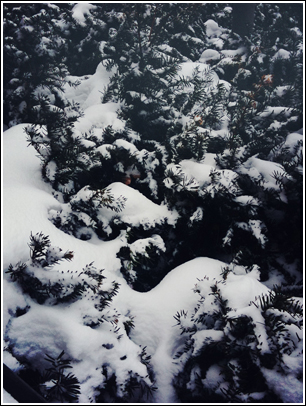|
|||||||||||||
| archives | submissions | blog | (dis)likes | ||||||||||
|
 |
|||
 |
|||
|
Monster, Days Like These, & Kept Curiosities |
|||
|
The Cuckoo Clock |
|||
|
To Be or Not to Be Isn't Really a Question & The Green is Wrong |
|||
Aria |
|||
 |
|||
|
Bradford Morrow |
|||
|
Spencer Wise is working on his PhD in Fiction at Florida State University. His writing has appeared in Time Out NY Magazine, SI.com, SmokeLong Quarterly, Quick Fiction, and 3:AM Magazine. |
|||

 |
 |
|
Photo by Valerie Molloy |
Before I left for the army, there were five of us camping in my father’s one-room cabin in Vermont. I watched a blond girl named Ingrid vomit spaghetti for a half hour, heaped over the sap bucket with the cast-iron spout, dipping the tips of her hair into her own puke.
Outside was blind dark: no houses for miles, no electricity, no moon, just the unplowed fire road where we duct-taped a glow stick to a football and threw the fade. We blew hot gusts of steam like bulls and mangled ourselves in a snowdrift—one collision after another. Soon I’d carry my world on my back, but here I was on the bottom, buried, nothing yet of the darkness broken by a bugle.
By the time we remembered Ingrid, my friend’s kid sister, she’d already crawled into the empty bathtub and gone to sleep.
Next morning I saw a devastating winter dawn, a forest of maples and box elder, all tapped, flowing into the collection buckets, and the air was sweet with amber sap. On the hill behind the creek, yellow crocuses broke through the crust of snow, and I felt someone behind me. “I can’t believe I’m alive,” is all Ingrid said, and I handed her my orange juice.
Kissing her—she was probably 15—seemed like the wrong thing to do, but for some reason that’s all I could think of. That my father was the best marksman in his infantry unit was never far from my mind, and here all I had to do was aim for that tusk of peach fuzz down her right cheek. What a dumb thing not to do, and I was being hard on myself, thinking about if they sent me to Kabul how I’d react, when Ingrid unsnapped her overalls and in her underwear walked barefoot straight into the freezing creek, all the time holding my orange juice above her head. She hadn’t taken a sip as though she wanted no further connection between us, not even the swap of a little backwash. Ingrid Birdin, who everyone called “The Burden,” suddenly seemed like the safest and most sacred thing in my life.
At the goodbye party my father held, he raised a can of Schlitz and told everyone how I came feet first into the world, five weeks premature, in the back of his convertible. “Hell, the war’s almost over,” he said, raising the beer, “but he never let bad timing stop him.”
That last evening in Vermont, a red-rumped tinkerbird flew into our cabin and we chased it out with whiskey bottles, laughing. We smashed chairs against the chimney flue and threw a football that struck the mounted deer head my father had shot with a single shell, and I don’t know how, but the bird escaped. Ingrid, too, escaped. I only know, standing here in Ft. Benning at 5am guarding the armory, breathing motor exhaust, in some distinct part of me, I have not.
